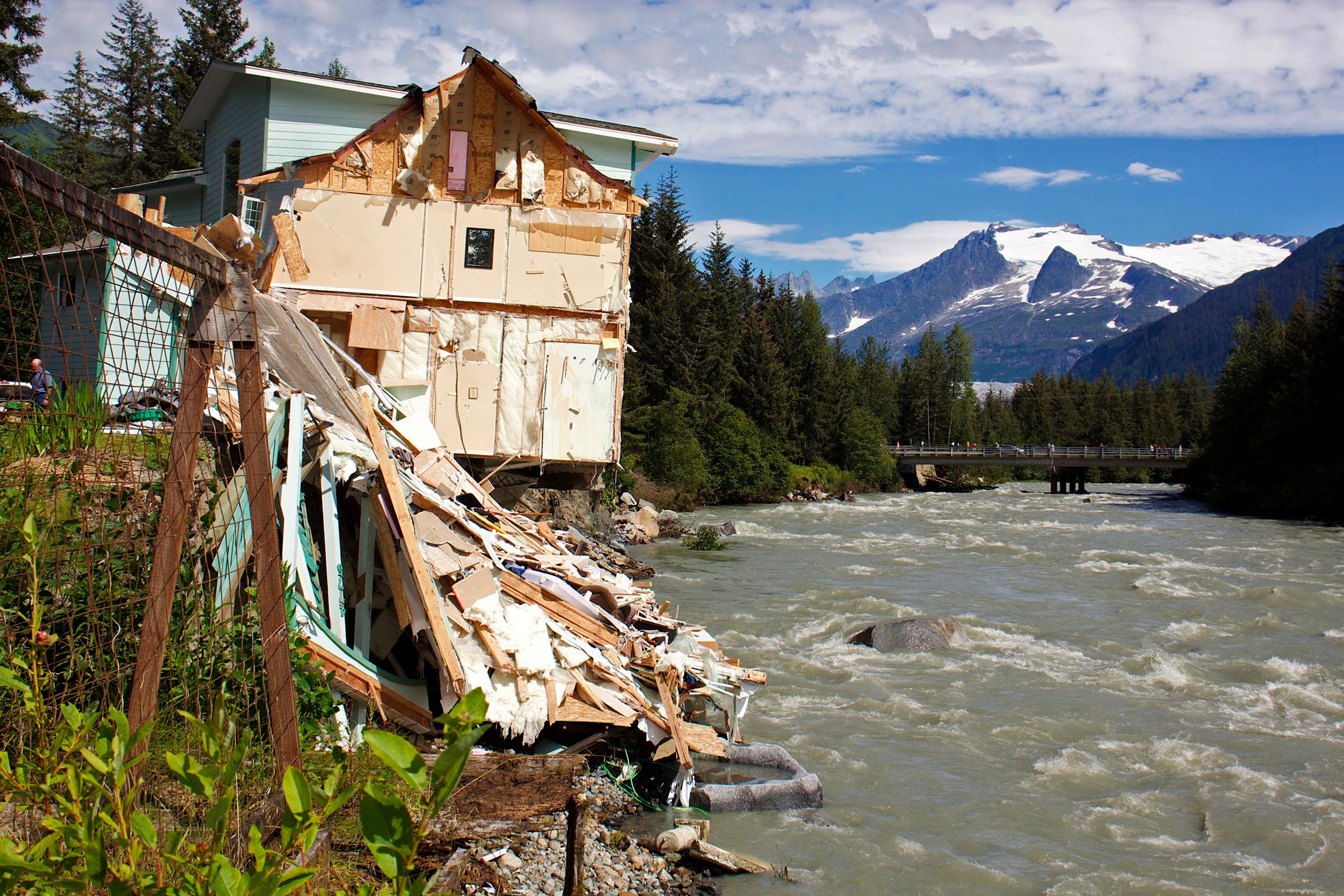I saw houses being washed away in Alaska. Stop the victim blaming
Glacial flooding destroyed my friends’ house in Juneau, writes Summer Koester


It was a hot, sunny day in Alaska’s capital city, uncharacteristic of the largest temperate rainforest in the world. My nineteen-year-old niece and I were chatting about global warming, as Alaskans do whenever we get too hot.
“Global warming?” my niece laughed. “More like global burning.”
Hours later, ice melt that had accumulated in a Mendenhall Glacier basin over the last year crested the glacial dam. That same day, a raging current swept the home where two friends and teaching colleagues of mine lived into Mendenhall River. The river soon began devouring the bank near my sister-in-law’s home. She spent several hours moving possessions from one side of the house to another in case part of her home fell into the river. Throughout the night, half of her neighbor’s house washed away. Friends on the other side of the river evacuated as neighborhoods and houses filled with diesel-smelling water.
My husband, a Juneau water utility worker, was called to shut off the water from the devastated home and others to prevent reservoirs from draining and depleting the city water supply. As he navigated hundreds of onlookers and police officers trying to keep citizens safe, hundred-year-old spruce trees floated down the river. He heard timber snapping and boulders ripping loose from the embankment.

In the end, no one was injured, gratefully. However, the cat belonging to my friends who lost their home is still missing. The next day, friends walked the streets looking for the missing cat. Locals set up GoFundMe accounts and offered up homes for displaced residents to stay in. Good samaritans brought around loaders to clean up debris littered along the Douglas boat launch. Beachgoers gathered oil barrels, eyeglasses, Christmas tree lights, family heirlooms, and building scaffolding that had washed up the shore. Some salvaged a ceiling truss and laid a blanket over it as a sun shade.
A viral TikTok video resulted in significant international coverage of the historic flooding. Across social media, comments poured in, ranging from support and condolences to victim blaming. “That’s what you get for building so close to the river,” wrote one. “Keep voting Republican, Alaska,” wrote another, “and enjoy the environmental price you pay.”
While I understand the urge to justify needless human suffering with victim blaming, such overgeneralizations are unhelpful and inaccurate. Although some might think Alaskans use sled dogs in lieu of email, Alaskans are very connected to the environment – economically, culturally, spiritually, and ancestrally. Climate change affects everything from fisheries to our receding glaciers to the land on which our homes sit. In Southeast Alaska, where the flood occurred, most voters believe climate change is real.
Just as the US discovered in 2020 that Latinos are not a voting monolith, neither are Alaskans. The state recently elected a Democrat to the US House of Representatives. The majority of voters in Southeast Alaska vote Democrat. Many of us are frustrated with our governor’s denial of human-caused climate change and pursuit of massive greenhouse gas-emitting drilling projects, like the Willow Project.
Regarding the decision to build homes on an eroding river bank, no one forecasted such devastation. The homes that flooded and washed into the river were 50 to 100 feet from the embankment; many were not even to be considered in a flood zone. Although the glacial outburst flooding occurs yearly, the ice dam, known as Suicide Basin, had never crested until this year. By some estimations, more than 150 acres of riverbank were devoured by the historic flood. Contributing to the rapid and massive loss is the fact that Mendenhall River sits on glacial silt, sediment from ground-up rock, and gravel caused by glacial erosion, which is more easily eroded than rivers bordered by bedrock.
Multiple families have been displaced or impacted due to this climate change disaster. One displaced teacher recently spent months in a neonatal intensive care unit with twin babies. Her home is now condemned as much of her condo’s structural foundation washed into the river. A total of ten members of the Juneau Education Association lost their homes. A website with various GoFundMe requests to assist all affected families has been set up to help the affected families.
In Maui, hurricane-fueled fires have resulted in dozens of deaths, people missing, and communities decimated. We should avoid shaming and guilt-tripping people about their choices regarding where they live.
Juneau school board member and insurance agent Emil Mackey, who adjusted damages from Hurricanes Katrina, Rita, and Wilma, recently wrote on a community forum: “A natural disaster could affect any of us. Nobody knows if there is a sinkhole under their home. [Being] told you should have done something different does not help. What does help is verbal support, food, water, shelter, and other outreach to help them recover.”
Rather than scapegoating victims to alleviate our grief that the world is burning, I urge people to help and donate to those in need.
Join our commenting forum
Join thought-provoking conversations, follow other Independent readers and see their replies
Comments


Bookmark popover
Removed from bookmarks